My Journey to New Guinea
by Peter Goerman
|
This is the story of how I got to New Guinea: After my 'compulsory' two years in Australia from 1965 to 1967 as an 'assisted migrant', I was free to leave again - and leave I did as it seemed impossible to live on what was initially a youth wage and later became the salary of a junior bank officer with the ANZ Bank. I had booked a passage back to Europe aboard the Greek ship 'PATRIS' operated by Chandris Line (or, as we came to call it, Chunder Line - but that is yet another story!) which had been scheduled to leave Sydney and call at Port Moresby on its way through the Suez Canal. But history and the Eqypt-Israeli war of 1967 [the so-called 6-Day War which began on June 5, 1967] intervened and the Suez Canal was closed to all shipping. So the 'PATRIS' never got to Port Moresby but sailed through the Great Australian Bight and around the Cape of Good Hope (Cape Town) instead. However, a good number of 'Territorians' from the then Territory of Papua & New Guinea had already booked a passage and the shipping line at great expense flew them down to Sydney to join the ship. And so it came that I spent some four weeks aboard the 'PATRIS' in the company of a whole bunch of hard-drinking and boisterous 'Territorians'. Having barely scraped together the fare, I had no money to spend on drinks but I did mix with the 'Territorians' night after night in the ship's Midnight Club to listen to Graham Bell and his Allstars. I was spellbound by the stories those 'larger-than-life' 'Territorians' told about the Territory and my mind was made up that I would go there one day. One of the 'Territorians' whom I befriended was Noel Butler who then lived in Wewak in the Sepik District. If New Guinea seemed remote and exotic, then the mystical Sepik District was even more remove and more exotic! It sounded all very Conrad-esque and straight out of "Heart of Darkness"! Noel had been sent up to the Territory as a soldier during the war and had never left it! After leaving the army, he tried his hand at coffee and tea in the Highlands and had held numerous positions of one kind or another ever since. He epitomised the typical 'Territorian' with his Devil-may-care attitude and his unconcern about the future, about money, and about a career. Somehow, for those people, the Territory provided everything they wanted from life and the rest of the world was a place that they visited once every other year during their three-month leave. Our love of chess made Noel and me shipboard mates and we spent many hours hunched over the chess board as the ship ploughed its way towards Europe. And as we played game after game, I learnt about the Territory and listened to stories of some of the Territory's 'old-timers', including one Errol Flynn of whom I had never heard before (but whose autobiography 'My Wicked, Wicked Ways' I was to read many years later.) It seemed the Territory attracted three types of people: missionaries, moneymakers, and misfits. Which category would I fit? Eventually the ship docked at Piraeus in Greece where Noel saw me off at the railway station as I was bound for Hamburg in Germany. I had been promised a job there and my thin wallet was in urgent need of some fattening-up! There was no time or money left for sightseeing as I boarded the train on a wintry Athens morning to spent several days transiting through Bulgaria, Yugoslavia, and Austria before reaching Germany. I spent the next few miserable winter months in Hamburg and then in Frankfurt before finding a way out again: I got a job in southern Africa which, as I saw it, was almost halfway back to where I eventually wanted to go: New Guinea. That is not to say that my career was a planned one. Although I have not been an out-and-out drifter, circumstance usually played a larger role than choice in what I did with my life - or perhaps I should say what life did to me (but that's probably true of most people's lives). With no money in my pocket, I had to rely on employers to get me back to the other side of the world. My destination was South West Africa, or Namibia as it is called now, which stretches north from South Africa's Orange River along 1280 kilometres of the loneliest, yet in parts most hauntingly beautiful coastlines touched by the Atlantic Ocean. The Namib desert, whose desolate sands have trapped and killed thousands of men and women of every race as they sought to unlock its secrets or merely to survive, runs right to the sea. The local Ovambo people call Namibia "the land God made in anger" and as the sun mercilessly bakes deserts, plains and mountains alike, it is a close cousin to hell. I spent some time in Lüderitz where I worked as a book-keeper for Metje & Ziegler Ltd. to earn the necessary money for a passage from Cape Town back to Australia where the ANZ Bank re-employed me immediately. But the die was cast and I knew I would find a way to get to the Territory. From Noel, with whom I had stayed in contact during all this time, I had heard about PIM, the Pacific Island Monthly which was read by one and all in the Territory. I bought a copy and decided to place in it a tiny classified ad which from memory ran something like this: "Young Accountant (still studying) seeks position in the Islands." The response was hardly overwhelming but the two letters I did receive were enough. One was from a Tom Hepworth of Pigeon Island Traders in the Outer Reef Islands in the then British Solomon Islands Protectorate who described to me in glowing terms the leisurely life on a small atoll in one of the remotest part of the South Pacific. It all sounded terribly tempting but his closing remarks that "of course, we couldn't pay you much at all..." stopped that particular day-dream as I had to think of my future and what future was there after several years spent on a tiny island away from anywhere and with no money in my pocket? (As it happened, I made contact with the Hepworths again almost 35 years later (but thereby hangs yet another tale.)
The other letter was from a Mr. Barry Weir, resident manager of the firm
of chartered accountants Hancock, Woodward & Neill
Rabaul was everything I had expected of the Territory:
it was a small
community settled around picturesque Simpson Harbour. The climate
was tropical with blazing sunshine and regular tropical downpours, the
vegetation strange and exotic, and the social life a complete change
from anything I had ever experienced before!
Each of us took a turn in doing the weekly shopping. I always dreaded when it was their turn as they merely bought a leg of lamb and spent the rest of the kitty to stock up on beer! We spent Saturday nights at the Palm Theatre sprawled in our banana chairs with an esky full of stubbies beside us. The others rarely spent a night at home; their nocturnal activities ranged from the Ambonese Club to the Ralum Club to the RSL. When they were well into their beers, mosquitoes would bite them and then fly straight into the wall! Then, next morning, they were like snails on Valium. How they managed to stay awake during office hours has always been a mystery to me!
When the local newspaper,
the POST-COURIER, began carrying ads for audit personnel on the
Bougainville Copper Project, I applied and was invited to fly across
for an interview in October 1970. In those early days, all incoming traffic stopped
at the transit camp at Kobuan where one had to wait for transport to
Panguna where Bechtel's "top brass" had their offices.
The road to Panguna was still something of an
adventure and it was some time before I could present myself to Sid
Lhotka, Bechtel's Manager of Administrative Services. He hired me on
the spot and I returned to Rabaul to give notice and get my things and
within a few weeks I was back "up top" only to be told that I would be
working at Loloho, senior auditor in charge of several large contracts
such as the construction of the harbour facilities (built by Hornibrook),
the Power House construction (built by World Services), the Arawa
Township (built by Morobe-ANG), and the haulage services (provided by
Brambles-Kennellys.) Des Hudson and a string of
time-keepers, amongst them Neil Jackson ("Jacko"),
Bob Green, and "Beau" Players joined the
team later.
We all lived in Camp Six which was idyllically situated on Loloho Beach. It had a certain hierarchy with "oldtimers" occupying the front row of dongas facing the beach, also known as "Millionaires' Row." Twice a week was film night to which viewers brought their own plastic chairs and victuals and liquid supplies and watched whatever was being offered (the Natives were crazy about Cowboy movies), against a backdrop of stars twinkling through swaying palm fronds and with the surf as background music. Payday was the big night in Camp Six with gambling tables such as Snakes & Ladders doing a roaring trade. Flick shows (with little to be seen across the tops of a dozen boisterous guys, all drinking and smoking, crammed into a 6-by-10ft donga) were also highly sought-after. The "boozer" (or Wet Canteen in the official language), set right on the beach of Loloho, was a great place for an evening out! Offshore, across the dark waters, several small islets marked the outer limits of the reef. We named them "Number One Island", "Number Two Island", and so on. On some night, after a sufficiently large intake of SP (also known as 'Swamp Piss'), heated debates would develop as to whether they were ships coming into port! Sometime in 1971 I transferred to Panguna where I was put in charge of the General Accounts Department with Brian Herde doing the Accounts Payable and Gaskill keeping the General Ledger. Neil Jackson somehow found his way "up top" as well and became offsider to Brian Herde, imitating one of the Three Musketeers by attacking all passers-by with a long wooden ruler until the day the booze got the better of him and he didn't turn up for work at all. Sid Lhotka visited him in his donga at Camp 3 and rumour has it that "Jacko" told him to f%@# off! He was on the next plane out!
After Bougainville came stints in the Solomons, back to PNG (setting up the Internal Audit Department for AIR NIUGINI
in Port Moresby where I ran into Brian Herde again who'd taken a job with Tutt Bryants), Rangoon in Burma, Samoa, Malaysia, Indonesia, Iran, PNG once again (setting up the tup-and-barge operations for Ok Tedi; Bechtel was back in town to manage this project
and with it came Sid Lhotka with whom I had dinner at the Papuan Hotel in Port Moresby to talk about "old times"), Saudi Arabia (where I met up with Des Hudson again), Greece - but
none of those assignments came ever close to the comraderie and esprit de corps of the years on Bougainville!
Over the years I repeatedly ran into "ex-Bougainvilleans" and "ex-Territorians" in Australia and elsewhere. We would swap yarns which always ended in a great deal
of nostalgia and a hankering for a way of life that would never come again.
Like myself, many had found it difficult to settle back into an "ordinary" life and, like myself, had moved from place to place in an attempt to recapture some of the old lifestyle.
If you know any persons mentioned or their present whereabouts, please contact Peter Goerman at riverbendnelligen@mail.com . I have also set up a website at
www.riverbendnelligen.com/bougainville.html in memory of the thousands of expats and locals who built and worked at the Bougainville copper mine.
|
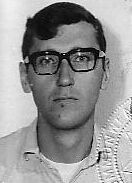
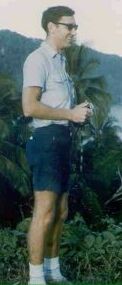 Perhaps it is the result of having read Coral Island
and Somerset Maugham at an impressionable age, but the South Pacific
islands have always evoked a powerfully romantic image with me.
Mention the South Seas and I conjure up a vision of waving
coconut palms and a dusky maiden strumming her ukelele. Silhouetted
against the setting sun, Trader Pete (that's me!) sits in a deck-chair
in front of his hut sipping a long gin and tonic while a steamboat
chugs into the lagoon, bringing mail from home.
Perhaps it is the result of having read Coral Island
and Somerset Maugham at an impressionable age, but the South Pacific
islands have always evoked a powerfully romantic image with me.
Mention the South Seas and I conjure up a vision of waving
coconut palms and a dusky maiden strumming her ukelele. Silhouetted
against the setting sun, Trader Pete (that's me!) sits in a deck-chair
in front of his hut sipping a long gin and tonic while a steamboat
chugs into the lagoon, bringing mail from home.
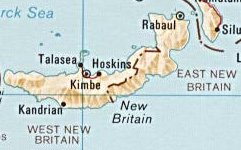 in Rabaul on the
island of New Britain in the Territory of Papua & New Guinea
who, subject to a satisfactory interview with their representative
in Australia, offered me the position of audit clerk. That was it!!!
I passed muster at the interview and in the dying days of the year
1969 I left Australia for New Guinea. I was on my way!!!
in Rabaul on the
island of New Britain in the Territory of Papua & New Guinea
who, subject to a satisfactory interview with their representative
in Australia, offered me the position of audit clerk. That was it!!!
I passed muster at the interview and in the dying days of the year
1969 I left Australia for New Guinea. I was on my way!!!
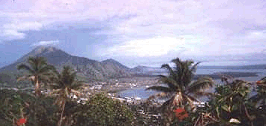 And to top it all, I
loved the work which offered challenges only available in a small
setting such as Rabaul where expatriate labour was at a premium. The
firm was small: the resident manager, his wife as secretary, and two
accountants (both still studying) plus myself. One of the accountants
was a real character who was destined never to leave the
Territory. For him the old aphorism came true that "if you spend
more than five years in New Guinea you were done for, you'd never
be able to get out, your energy would be gone, and you'd rot there
like an aged palm." He and an accountant from another chartered firm
and myself shared a company house (which
was really an old Chinese tradestore) in Vulcan Street
and a 'hausboi' who answered to the name of Getup. "Getup!!!" "Yes,
masta!"
And to top it all, I
loved the work which offered challenges only available in a small
setting such as Rabaul where expatriate labour was at a premium. The
firm was small: the resident manager, his wife as secretary, and two
accountants (both still studying) plus myself. One of the accountants
was a real character who was destined never to leave the
Territory. For him the old aphorism came true that "if you spend
more than five years in New Guinea you were done for, you'd never
be able to get out, your energy would be gone, and you'd rot there
like an aged palm." He and an accountant from another chartered firm
and myself shared a company house (which
was really an old Chinese tradestore) in Vulcan Street
and a 'hausboi' who answered to the name of Getup. "Getup!!!" "Yes,
masta!"
 Easter 1970 gave me the chance to visit my old mate Noel Butler when
the Rabaul tennis club chartered a DC3 to fly to Wewak for some
sort of tournament. I got a seat aboard and visited Noel who lived
on his own little estate along the Hawain River some ten miles outside Wewak.
It was a wonderful place! Tilly lamps at night and a shower gravity-fed
from a rooftop holding tank which was refilled by the 'haus boi'
with a handpump. A native village was just down the road and far into
the night small bands of villagers would pass the house strumming
their ukeleles. An alcoholic beachcomber by the name of McKenzie
(who was said to be an excellent carpenter on the few occasions when
he was off the grog) lived even farther out than Noel. He had no transport
which however did not stop him from walking all the way into Wewak to quench his
ever-present thirst at the Sepik Club. On his return late at night he would stagger
in to Noel's for a few more noggins to propel him on his way. In later years
some friendly people in town fixed him up with a donkey which used to carry
him home safely. The Territory was full of characters like McKenzie.
Easter 1970 gave me the chance to visit my old mate Noel Butler when
the Rabaul tennis club chartered a DC3 to fly to Wewak for some
sort of tournament. I got a seat aboard and visited Noel who lived
on his own little estate along the Hawain River some ten miles outside Wewak.
It was a wonderful place! Tilly lamps at night and a shower gravity-fed
from a rooftop holding tank which was refilled by the 'haus boi'
with a handpump. A native village was just down the road and far into
the night small bands of villagers would pass the house strumming
their ukeleles. An alcoholic beachcomber by the name of McKenzie
(who was said to be an excellent carpenter on the few occasions when
he was off the grog) lived even farther out than Noel. He had no transport
which however did not stop him from walking all the way into Wewak to quench his
ever-present thirst at the Sepik Club. On his return late at night he would stagger
in to Noel's for a few more noggins to propel him on his way. In later years
some friendly people in town fixed him up with a donkey which used to carry
him home safely. The Territory was full of characters like McKenzie.
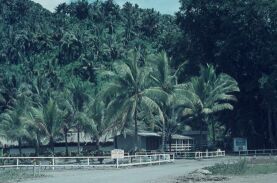
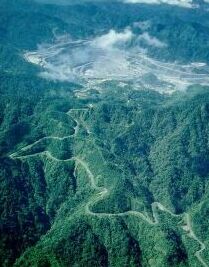
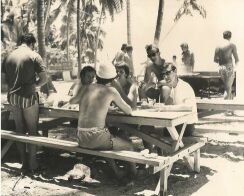
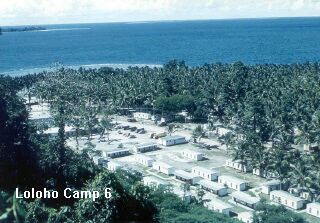 During my time on the island I became a Justice of the Peace and also
obtained my registration as a tax agent (
During my time on the island I became a Justice of the Peace and also
obtained my registration as a tax agent (